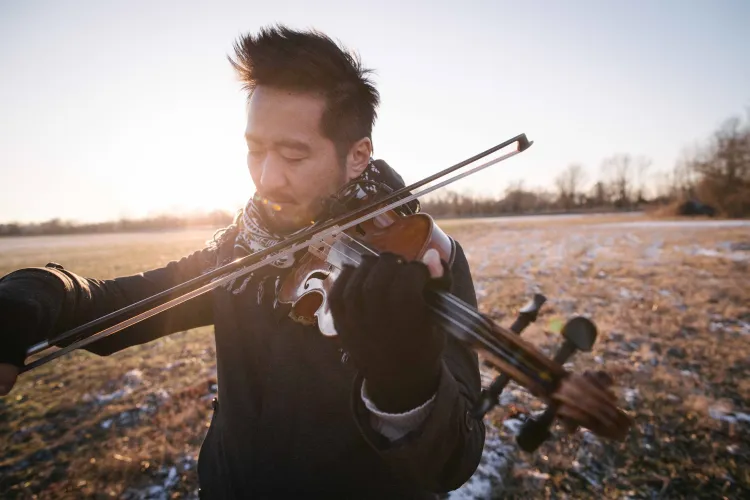Musician and Filmaker Kishi Bashi Visits Swarthmore

To have empathy and compassion for one another – Omoiyari. This concept, despite how simple it may seem, has been tossed aside many times in American history amidst irrational fear and discrimination. February 19th marked this year's Day of Remembrance for some 120,000 Japanese Americans who were forcibly removed from their homes and incarcerated in 10 different camps across the U.S. during WWII. Kishi Bashi – pseudonym of singer-songwriter, multi-instrumentalist, and filmmaker Kaoru Ishibashi – highlights this chapter of American history through his 2023 movie, A Song Film by Kishi Bashi: Omoiyari and its accompanying soundtrack album Music from the Song Film: Omoiyari. Kishi Bashi visits Swarthmore this week with two exciting events in store: a panel discussion about his film in the Scheuer Room on Thursday, February 22nd at 4:30 pm and a screening of Omoiyari in LPAC cinema with a live performance on Friday, February 23rd at 6 pm.
Kishi Bashi’s background in music is diverse. The multi-instrumentalist, who studied film scoring at Berklee College of Music, has recorded and toured internationally as a violinist with a range of renowned musicians from Regina Spektor to Sondre Lerche. Founder and singer of Jupiter One, a Brooklyn-based indie rock group, Kishi Bashi has played at major festivals such as SXSW and Austin City Limits. The artist has multiple solo albums including his 2012 debut 151a and 2016’s Sonderlust which was featured on NPR’s ‘All Songs Considered’ podcast. Now based in Athens, Georgia, Kishi Bashi’s latest work, Omoiyari, is an ambitious project of memory, music, and what it means to be a minority in America.
“I was really moved by the film and performance,” says Swarthmore’s Professor Lei X Ouyang, who is the event’s main organizer. Ouyang, who teaches an ethnomusicology course about Taiko and the Asian American experience, remarks that, “[My class] is often one of the first places students [learn] about Japanese American incarceration . . . I would like us to do a better job—K through 12 and higher ed—of covering this.”
Swarthmore’s history intersects with the incarceration of Japanese Americans during this time period by way of the National Japanese American Student Relocation Council (NJASRC). “At the time, it was Swarthmore president [John Nason] who was the chair of that program,” Ouyang notes. The NJASRC worked to bring college aged Japanese Americans out of the camps and onto college and university campuses across America. By the end of WWII, Nason and the NJASRC had helped nearly 5,000 Japanese American students escape incarceration and continue their studies, some of whom did so at Swarthmore.
Thursday’s panel discussion will provide a space to discuss Kishi Bashi’s work and examine how he uses it to bring visibility to Japanese-American history and the history of other oppressed groups in America. The panel will feature Kishi Bashi himself along with three Swarthmore faculty: Professors Ouyang, Tracey Stewart, and Vivian Truong. “As an ethnomusicologist,” Ouyang says, “I found [the film] particularly compelling because it is truly a creative, artistic musical project — but there's also a very important depth and meaning and history. This idea that he went around and had conversations with different survivors, that that's informing his creative process . . . that he wants to bring more visibility to this aspect of American history [and] connect it to other injustices was particularly striking.”
In addition to Ouyang’s perspective, Professor Stewart and Truong will share their observations of the film from their respective lenses of ethnomusicology and Asian American studies. Both of Professor Stewart’s ethnomusicology courses this semester, “Performing Resistance: Black Music and Protest in the African Diaspora” and “From Roots to Django: Interpreting the Soundtracks of Black Power, Black Pain, Black Joy, and Retribution,” carry significant intersections with the film’s themes. Professor Troung’s deep engagements with both Asian American histories and activism will similarly provide additional depth and context for the discussion.
Friday’s subsequent screening will give audience members a chance to see the film, followed by a live performance by Kishi Bashi and Mike Savino (aka Tall Tall Trees), a regular of Kishi Bashi’s touring band. Ouyang hopes Kishi Bashi’s film can help audience members reflect on how music plays a role in remembering and in activism. Furthermore, she is interested in how Kishi Bashi’s work deals with solidarity: “What does it mean to understand that there’s a history of oppression within one group [and] tapping into that within one’s own community to better understand how to support a community that is not your own.”
The panel discussion will be held on Thursday, February 22nd at 4:30 pm in the Scheuer Room while the Omoiyari screening, live performance, and Q&A will take place in LPAC Cinema on Friday, February 23rd at 6 pm. Both events are free and open to the public.



